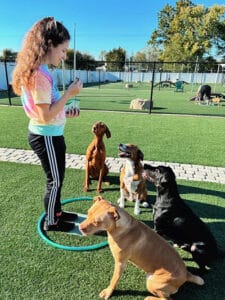Training your dog is essential. Many of us want to treat them like little furry humans – but they aren’t – they are animals – who with the right nurturing and training become members of our family. Training is a time investment in the beginning, or at any stage of the relationship, and requires maintenance and consistency thereafter, but the rewards will last a lifetime. A trained dog will interact best in the combined environments of the human world and the world of nature. Here are some of the benefits of training:
- A trained dog is a safer dog: A pet that responds to your commands is inherently safer than one who does not. A dog who responds to your commands is less likely to get into a dangerous encounter with another dog, or chase something into a street, or do things which endanger them that a simple “no” or “come” could prevent.
- A trained dog makes for a safer home: A trained dog learns to respect your home because it is also their home. When boundaries are taught, a lot will be saved on furniture repair, stress will be lessened, and the anxiety experienced by pet and pet owner will be significantly decreased. When your pet is out of sight inside the house or you need to leave the house for periods of time, it helps when you know you can trust them.
- A trained dog is a dog who has bonded with its owner: A trained dog develops a strong connection with its owner. There is a clear understanding of roles which furthers the nurturing and the relationship between pet and owner. A mutual respect develops and becomes the best kind of pet ownership experience.
- A trained dog is easier to walk: A trained dog does not walk the human – the human walks the dog. Walks are very important experiences with your dog. It allows them to interact with nature, and the stimulus is very good for their sense of curiosity. An untrained dog pulls and yanks the owner, and ultimately this results in less walks.
- A trained dog is easier for the vet to examine: A trained dog will permit others to handle him. A proper examination by a vet in times of crisis is crucial. An untrained dog who prevents others from examining or treating them poses a risk of not receiving essential and critical care when it counts most.
- A trained dog makes other dogs safer: A trained dog is less likely to behave in a way that will spook other dogs. This is important for group play and the occasional unexpected interaction. When your dog is taught how to respond to other dogs, they will be less threatening – and less threatened. It makes for a safer dynamic for all pets and humans present.

Carolyn
Carolyn Lapps is the General Manager at Fetch Family Pet Resort. Her love and passion for all animals began at a young age and has led to a career. She is frequently consulted on pet socialization, family integration issues, and is highly regarded for her experience with domestic animal management and care.

